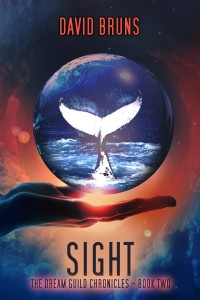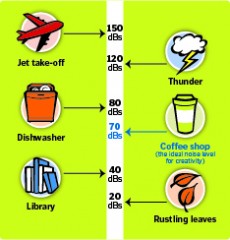A Writer’s Secret Productivity Weapon: Coffee Shops
 I’m a firm believer in daily word counts. I need to see the positive reinforcement of new pages and new chapters to motivate me to keep going.
I’m a firm believer in daily word counts. I need to see the positive reinforcement of new pages and new chapters to motivate me to keep going.
When I wrote my first book, I even printed out each chapter as soon as I had written it so I could add it to the growing pile of pages. I told myself I did it for protection in the event of a computer failure, but really it was so I could measure my progress in a tangible way.
Whatever keeps you going.
My Search for Writing Productivity
When I started writing my series The Dream Guild Chronicles, I did some research into ways to be more productive as a writer. Rachel Aaron’s gem of a book 2K to 10K: Writing Faster, Writing Better, and Writing More of What You Love, was just what the doctor ordered. In a collection of essays, (most of the same info is on her website as various blog posts, but the book is only 99 cents) Aaron describes her own writing process and her battle to keep–and improve–her word counts as life started to intrude on her writing time. One piece of her advice did not make sense to me: write in coffee shops.
“That’ll never work for me,” I thought. “I need quiet.”
And it’s true. When I’m home and the TV is blaring downstairs, I have a hard time concentrating. I don’t even listen to music when I write as it find it distracts me.
A few weeks later I ran across a neat graphic in Experience Life magazine.
Clearly this was the universe sending me a message. I decided to run an experiment.
My Results
 I was in the midst of drafting the second book in my series, SIGHT. I had some recent data on daily word counts, so I decided to write in my local coffee shop for the next week and do a side-by-side comparison of the results.
I was in the midst of drafting the second book in my series, SIGHT. I had some recent data on daily word counts, so I decided to write in my local coffee shop for the next week and do a side-by-side comparison of the results.
I saw a difference right away. My daily word count goal is 2000 words, and I was taking up to four hours to make that happen. My first day I logged 3751 words in about three hours, a huge improvement. Over the course of the experiment, I saw an average 50% improvement of hourly word counts when writing in a coffee shop vs. at home.* Even better, the resulting text was cleaner and read better in editing.
Why Does It Work?
My unscientific study aside, it’s a fact that my productivity is higher when I write at coffee shops. But why?
- Noise Level – The Experience Life graphic focuses on this aspect and links to scientific work done on the “right” noise levels to enhance creativity, but I’m convinced it’s more than that. A coffee shop offers the right amount of transient noise, people coming and going to stimulate (but not over-stimulate) the creativity muscle. I know this because I’ve tested different coffee shops and bakeries, making notes about which ones work and which ones don’t and why. (Yes, I know this is a little OCD, but, dammit, Bones, it’s all in the name of science!)
- Internet access – Aaron hints at this reason, and I agree. In my office, I have two screens and great internet access. It’s hard not to take that moment to look up that one detail you absolutely must have to continue on to the next sentence… Can I get on the internet in my local Caribou Coffee if I need to? Yes, but I don’t because of the next reason.
- Purpose – When I ride my bike down to the Caribou on the corner, I am consciously leaving my house for a reason: to write. In essence, I am going to the office, and I can’t come home until I get my work done. I’m convinced there’s an extra smidge of motivation in that commitment.
Coffee shops are not a cure-all solution to writing productivity. If I’m not prepared to write (i.e. research done, outlines, etc.) then writing in a coffee shop is actually less productive than my office. Also, my experiment is exclusively related to first draft writing, not revising or editing.
So, thank you, Rachel Aaron, you've made a coffee shop believer out of me!
* The actual numbers were 640 WPH in my office vs. 959 WPH in a coffee shop, exactly 50% improvement.
David Bruns is the creator of the sci-fi series The Dream Guild Chronicles, and one half of the Two Navy Guys and a Novel blog series about co-writing the military thriller, Weapons of Mass Deception. Check out his website for a free sample of his work.


